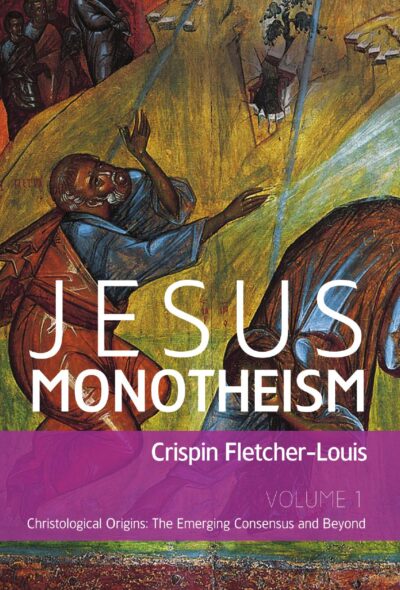
Digital edition of Jesus Monotheism, Volume 1 (PDF, EPub, MOBI – for kindle), plus:
-
A free copy of Jesus Monotheism: A Summary of the Argument (Whymanity Publishing, 2016).
-
A 40% discount on the paperback (available here on the Wipf & Stock website).
-
Slide decks to accompany each chapter (Keynote and Powerpoint)
Secure payment. We do not store your card details. We will email you download links.
Here is an extract of Jesus Monotheism: Volume 1, including the Table of Contents.
Summary of Book Contents
Jesus Monotheism Volume 1. Christological Origins: The Emerging Consensus and Beyond introduces the Jesus Monotheism project with a survey of the current state of scholarship, some critical evaluation of the most important contributions, a few modest proposals to support the arguments of what I judge to be an emerging consensus, led by the likes of Larry Hurtado and Richard Bauckham, and some desiderata for research and discussion.
Part 1 endorses several of the principal arguments put forward by Hurtado, Bauckham and their colleagues. The earliest Christian documents (in the NT) propound a “Christological monotheism” (N.T. Wright’s expression) or a Christology of divine identity (Bauckham), in which Christ Jesus is fully identified with the one God of Israel’s scriptures. He receives worship or cultic devotion as such (Hurtado’s contribution). Historically, these two—a remarkably high, or fully developed, christological belief and practice—are attested in the earliest phase of the new movement that arose after the crucifixion. So, this divine Christology took shape when the movement was thoroughly Jewish in its membership, leadership makeup, and culture. The conceptual building blocks for a divine Christology were found in Israel’s scriptures, as well as the experience and accounts of Jesus’ life. The earliest divine Christology is not, apparently, the product of later or external factors, such as the influence of Greek thought. Some observations on the numerical structure of one key text—the confession in 1 Corinthians 8:6—lend fresh support for the emerging consensus account of christological origins.
Part 2 identifies some problems and lacunae in the emerging consensus account of both the shape of the earliest divine Christology and an explanation of its origins. In terms of shape, the emerging consensus scholars pay insufficient attention to the central role of a belief in Christ’s incarnation in the NT texts and sometimes underplay the distinct identities of God the Father and Lord Jesus Christ. There are also problems with the way that they understand the “Son of Man” expression in the gospels. In terms of the origins of a divine Christology, the model(s) developed by Hurtado and Bauckham have not yet provided a satisfactory account of its principal causes. Hurtado thinks that powerful religious experiences after Jesus’ death led to Christ devotion. Bauckham has not published a full account of his view of Christological origins, but he emphasises especially the role of scriptural interpretation. There are problems with both models, especially with Hurtado’s eschewing the possibility that Jesus himself made divine self-claims. Both seem to some extent, to sideline the New Testament’s own witness: it all began with Jesus’ self-understanding, which was vindicated at the resurrection. Such problems mean the pressing historical question has yet to be answered in a way that would warrant wider scholarly agreement or consensus.
One problem in the workings of these emerging consensus scholars has been their insistence on a radical discontinuity between the earliest beliefs about Christ’s divine identity and anything in Israel’s scriptures and late Second Temple Judaism that might be thought to have anticipated such a belief and the concomitant worship of Christ. Part 3 of Jesus Monotheism, Volume 1 adumbrates the arguments of later volumes, with three case studies examining possible precedents for that worship: 1. The worship of the Enochic Son of Man in the Similitudes of Enoch (in the light especially of the studies of scholars in the Enoch Seminar), 2. A possible worshipful devotion to a Jewish ruler or messiah figure (a thesis put forward by William Horbury) and, 3. The worship of Adam as God’s image in a Worship of Adam story, attested in Life of Adam and Eve 12–16.
Part 3 also includes critical discussion of the understanding of the absolute qualitative difference between God and all reality that emerging consensus scholars, following Bauckham, espouse.
About the Author
 Crispin Fletcher-Louis (D.Phil, Oxford) is a Visiting Fellow and Postgraduate Supervisor at the University of Gloucestershire, UK and the Director of Whymanity Research and Training. He has held posts at King’s College London, and the universities of Durham and Nottingham. He was the founder of Westminster Theological Centre, where he served as the Principal until 2012.
Crispin Fletcher-Louis (D.Phil, Oxford) is a Visiting Fellow and Postgraduate Supervisor at the University of Gloucestershire, UK and the Director of Whymanity Research and Training. He has held posts at King’s College London, and the universities of Durham and Nottingham. He was the founder of Westminster Theological Centre, where he served as the Principal until 2012.
Here is Crispin’s blog dedicated to the discussion of Jesus Monotheism and its wider implications for biblical theology.
Podcast Interviews
Crispin chatted with Prof. Matthew Bates, of Northern Seminary, about Jesus Monotheism, Volume 1 for the OnScript Podcast (June 21, 2016)
Crispin chatted with Tim Mackie and John Collins at the Bible Project (July 22nd, 2019)
Jesus Monotheism: Volume 1 Product details
- Formats: PDF, EPub and MOBI (all available with one purchase)
- File Size: PDF: 2.7 MB; EPub: 1 MB; MOBI: 1 MB
- Print Length (PDF): 388 Pages
- Published: August 2015
- Digital Edition Publisher: Whymanity Publishing
- Digital ISBN-13: 9780993317200
- Paperback Publisher: Wipf & Stock (www.wipfandstock.com)
- Paperback ISBN-13: 9781620328897
Jesus Monotheism: A Summary of the Argument Product details
- Formats: PDF, EPub and MOBI (all available with one purchase)
- File Size: PDF: 1.1 MB; EPub: 1.6 MB; MOBI: 274 KB
- Print Length (PDF): 145 Pages
- Published: February 2016
- Digital Edition Publisher: Whymanity Publishing
- Digital ISBN-13: 978-0-9933172-1-7
- Paperback: not currently available
Peer Review Endorsements
“I had already bought the hard copy, but when I saw how many notes I needed to take, I decided I’d better get the PDF and save myself some typing time!”
Prof. Craig Keener, Asbury Theological Seminary.
“Very stimulating and convincing.” Prof. Joshua Jipp, Trinity Evangelical Divinity School
“This book reflects impressive acquaintance with a large body of primary data and a wide swath of scholarly literature and prolonged and energetic engagement with the issues discussed. … The book is also the first installment on a remarkable big-idea project … [that] deserves (and will require) careful study and will surely create interest in the projected volumes in which Fletcher-Louis will explicate fully his own “new paradigm” of how the remarkable devotion to Jesus reflected in the New Testament first emerged.”
Prof. Larry H. Hurtado, University of Edinburgh (Review of Biblical Literature 19th August, 2016)
“Volume one of Jesus Monotheism begins a massively ambitious and learned project. Crispin is a trailblazing voice arguing that the historical Jesus believed himself to be uniquely included within the identity of the one God. It is time that this thesis be once again entertained.”
Dr Chris Tilling, St Mellitus College (British New Testament Conference 2016, panel review of Jesus Monotheism, Volume 1.
Related and Future Publications
Coming soon:
C. Fletcher-Louis, Philippians, John, and a New Approach to the Investigation of the First Gospel
Our Privacy Policy and Terms and Conditions.